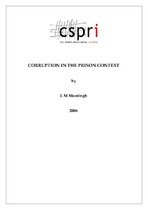| dc.description.abstract | The point of departure of this paper is that, in general, corruption is a human rights issue, which is accentuated in the prison context given the nature of imprisonment. Three factors create an intrinsic risk for corruption in prisons. Firstly, the all-encompassing nature of imprisonment regulates every aspect of prisoners’ daily lives: from having the most basic necessities to having access to luxury items, or even illegal items and activities. This unavoidably creates a situation where some goods are scarce, and demand and reward exists for their supply. Secondly, the state as the controller, establishes a highly unequal power relationship between the prison bureaucracy (represented by the warder) and the prison population. Thirdly, the closed nature of prisons and their general marginalisation from the public eye and political discourse do not assist in making prisons more transparent. Against this backdrop, poor management, weak leadership or organised crime can have a devastating impact on the overall operation of a prison system and, ultimately, on the human rights of prisoners. | en_US |

